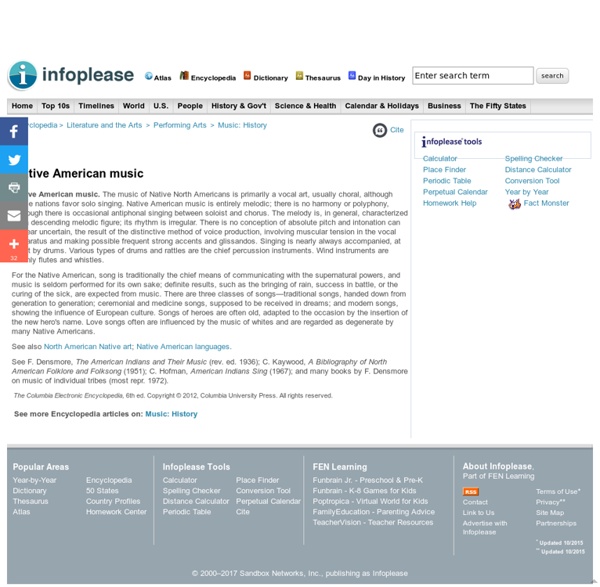Native American music
Characteristics[edit] Singing and percussion are the most important aspects of traditional Native American music. Vocalization takes many forms, ranging from solo and choral song to responsorial, unison and multipart singing. Percussion, especially drums and rattles, are common accompaniment to keep the rhythm steady for the singers, who generally use their native language or non-lexical vocables (nonsense syllables). Traditional music usually begins with slow and steady beats that grow gradually faster and more emphatic, while various flourishes like drum and rattle tremolos, shouts and accented patterns add variety and signal changes in performance for singers and dancers.[1] Song texts and sources[edit] Native American song texts include both public pieces and secret songs, said to be "ancient and unchanging", which are used only for sacred and ceremonial purposes. Societal role[edit] The styles and purposes of music vary greatly between and among each Native American tribe.
Christian Music
Native American music and culture
Music plays an integral role in the daily life of Native Americans. Music plays an integral role in the life of Native Americans. It is used for ceremonial purposes, recreation, expression, and healing. There are many different instruments used when making Native American music, including drums, flutes, and other percussion instruments. Vocals are the backbone of the music made in Native American cultures. Many researchers feel that Native American music is some of the most complex ever performed. Related Stories: Native American Music Share This Page with Your Friends
Cajun Music
Reggae
Reggae is a music genre that originated in Jamaica in the late 1960s. While sometimes used in a broad sense to refer to most types of popular Jamaican dance music, the term reggae more properly denotes a particular music style that was strongly influenced by traditional mento and calypso music, as well as American jazz and rhythm and blues, and evolved out of the earlier genres ska and rocksteady. Stylistically, reggae incorporates some of the musical elements of rhythm and blues, jazz, mento, calypso, African, and Latin American music, as well as other genres. One of the most easily recognizable elements is offbeat rhythms; staccato chords played by a guitar or piano (or both) on the offbeats of the measure. The tempo of reggae is usually slower than ska and rocksteady.[1] The concept of "call and response" can be found throughout reggae music. Reggae has spread to many countries across the world, often incorporating local instruments and fusing with other genres. Etymology[edit]
Tex-Mex Music
how to play reggae - The Top 10 Reggae Instruments and Some
Here are the top 10 reggae instruments you will see in most reggae band and hear on most reggae recordings. Let me reiterate, these are just the top 10 reggae instruments and some, please note that any instrument can be used in reggae. Peter Tosh was known to have used up to twent y reggae instruments at a time to record. 1. The Guitar Where would reggae be without the tired but true sound of the reggae guitar? 2. The bass is the most important reggae instrument. 3. As a reggae instrument the piano is hardly used these days for obvious reasons. 4. These days when people speak of reggae instruments the organ does not readily springs to mind. 5. The clavinet like the upright piano and many other reggae instruments, is not used much these days but when it is used it adds interest and difference to the sound. 6. The reggae keyboard is the most flexible of all the reggae instruments and it has made many reggae instruments redundant in many bands. 7. 8. 9. 10. And Some
Salsa Music
Salsa music
Conga drums, one of the foundational instruments of salsa music. Salsa is primarily Cuban son, itself a fusion of Spanish canción and guitar and Afro-Cuban percussion, merged with North American music styles such as jazz. Salsa also occasionally incorporates elements of rock, R&B, and funk.[6] All of these non-Cuban elements are grafted onto the basic Cuban son montuno template when performed within the context of salsa.[7] Salsa as a musical term[edit] "In 1973, I hosted the television show Salsa which was the first reference to this particular music as salsa. But promotion certainly wasn't the only factor in the music's success, as Sanabria makes clear: "Musicians were busy creating the music but played no role in promoting the name salsa Globally, the term salsa has eclipsed the original names of the various Cuban musical genres it encompasses. Issues of identity and ownership[edit] The Cuban origins of the music do not conveniently fit into the pan-Latino narrative. Lyrics[edit]
Reggae Music



